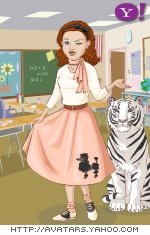I read through a few of the articles linked. Some parts were very library specific and I felt at times that I was not in my comfort zone. There were some vocabulary words that are not commonly used in a math classroom. However, I did find that there were some interesting points made. In the article by Dr. Schultz she talks about a vision of where libraries are going. The description of what are libraries is similar to how I would describe classrooms. Some classes are still back in Classroom 1.0, but most are moving toward Classroom 2.0 where the students are a community of learners. This is similar to the idea of the library having the information and people coming to you to get it. In the article by Rick Anderson he mentions that one of the icebergs is the "come to us" model. I believe this is true for all educators. The more we can reach our students in their natural environments the better off we all will be.
In the Schultz article I liked reading about her vision of the Library 4.0. Complete with coffee and malt beverages. Upon reading that I realized that if my local library had a coffee cart and allowed me my latte indulgence while browsing the books I literally would spend hours there. I love going to a coffee shop to do my grading, meet with friends, catch up on homework, or just take in the smell. In the library the smell is dusty, no drinks allowed so I can't even bring my own. As overpriced as lattes and mochas are, I bet my local branch could bring in enough cash to open up on Mondays again. But this would require the librarians to be ok with books smelling like coffee and the screetching sound of steaming milk. Perhaps we aren't there yet.
The future of my classroom is already changing again. This year we have new books for our Algebra classes. The books themselves are not far from what we used when we were in school. We still get to solve for x. However, the books now come with a miriade of online materials. There are questions in the book that you can find worked out online if you get stuck and need another example. There are online quizzes and tutorials to make sure you are prepared for the exams. There are glosseries in other languages. Calculators and other demonstarations to help each student see the reasoning behind the answers. If you have a computer and a connection to the internet you may not even need your teacher anymore. I don't see the books themselves being replaced completely. Even just today I printed these articles to read because I couldn't focus well on the screen. It was mentioned in the articles themselves that the new libraries are not replacing the old, but integrating with them. Parts of life that we call "old school" are being included with the newer innovations.
I could probably write a two page article myself about all of the changes this 2.0, 3.0, 4.0 buzz is bringing about. There are many overlaps between the libraries future and the future of classrooms. Especially, in allowing patrons and students to contribute to the learning community. No longer is the librarian or teacher the sage on the hill that we come to see for learning, but more and more is a guide to the world of information available at your fingertips.
Saturday, August 1, 2009
Subscribe to:
Post Comments (Atom)

No comments:
Post a Comment